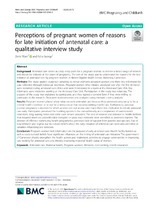Perceptions of pregnant women of reasons for late initiation of antenatal care: A qualitative interview study
Abstract
Background: Antenatal care serves as a key entry point for a pregnant woman to receive a broad range of services and should be initiated at the onset of pregnancy. The aim of the study was to understand the reasons for the late initiation of antenatal care by pregnant women in Nkwen Baptist Health Centre, Bamenda, Cameroon.
Methods: The study applied purposive sampling to recruit eighteen pregnant women and three key informants for data collection through individual interviews. Pregnant women who initiated antenatal care after the first trimester were recruited during antenatal care clinics and were interviewed in a room at the Antenatal Care Unit. Key informants were midwives working at the Antenatal Care Unit. Participation in the study was voluntary. The purpose of the study was explained to participants, and they signed a consent form if they were willing to participate in the research. Data were audio-recorded and analyzed using thematic coding analysis.
Results: Pregnant women placed a low value on early antenatal care because they perceived pregnancy to be a normal health condition or to not be a serious issue that required seeking health care. Furthermore, previous positive pregnancy outcomes for which women did not access care made them less motivated to initiate antenatal care early. Participants perceived the booking system to be user-unfriendly and complained of overcrowded conditions, long waiting times and some rude service providers. The cost of services and distance to health facilities that required travel via uncomfortable transport on poor road networks were identified as perceived barriers. The absence of effective community health programmes, perceived lack of support from parents and spouses, fear of bewitchment and stigma due to cultural beliefs about the early initiation of antenatal care were also identified as variables influencing late initiation.
Conclusion: Pregnant women lack information on the purpose of early antenatal care. Health facility barriers as well as socio-cultural beliefs have significant influences on the timing of antenatal care initiation. The government of Cameroon should strengthen the health system and implement activities to engage communities in improving care seeking for antenatal care and thereby improving maternal health status of women.

